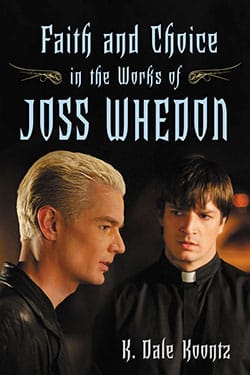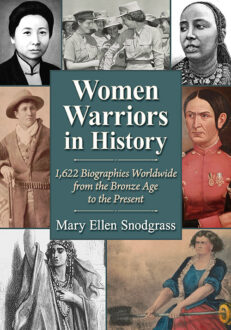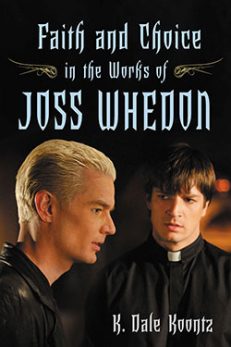Faith and Choice in the Works of Joss Whedon
Original price was: $29.95.$23.99Current price is: $23.99.
In stock
About the Book
Joss Whedon once identified himself as an “angry, hard-line atheist” who is nevertheless “fascinated by the concept of devotion.” While organized religion seems to hold no satisfactory answers for Whedon, his dedication to exploring the meanings of faith and belief can be seen in many of the characters he has created for such works as Buffy the Vampire Slayer, Angel, Firefly, Serenity, and Fray. This work examines a variety of Whedon’s characters and discusses what can be learned from their struggles and discoveries regarding religion and belief.
Part One focuses on the characters’ search for purpose, revealing how Dawn, Spike, and Angel attempt to define the meaning of their lives in Buffy the Vampire Slayer and its spin-off, Angel. Part Two focuses on family, examining the unconventional family dynamic in Whedon’s comic book miniseries Fray and television series Firefly. Part Three centers around the concept of redemption, using Angel’s Doyle, Firefly’s Malcolm Reynolds and Shepherd Book, and Buffy’s Faith Lehane to examine the characters’ search for salvation and their own acceptance of their past actions. Finally, Part Four focuses on the harmful potential of religious zealotry, revealing the negative aspects of absolute belief through Firefly’s River and Buffy’s Caleb. A primary source guide follows the main text, providing the writer, director, and air date of each television episode, along with publication data for Whedon’s print works, including the in-publication “Season 8” comic books for Buffy the Vampire Slayer.
About the Author(s)
Bibliographic Details
K. Dale Koontz
Format: softcover (6 x 9)
Pages: 241
Bibliographic Info: notes, bibliography, index
Copyright Date: 2008
pISBN: 978-0-7864-3476-3
eISBN: 978-0-7864-5523-2
Imprint: McFarland
Table of Contents
Author’s Note vii
Introduction 1
Part 1. Purpose: The Road to Damascus
1. What’s a Key Without a Lock?: Dawn and the Promise of Purpose 13
2. Growing After Death: Angel, Spike and the Evolution of the Soul 27
Part 2. Family: A Place at the Table
3. Coming Apart, but Moving Forward: Magic Twins and Older Sisters in Fray 49
4. A Family of Believers, Just Not in the Same Thing: Faith in the Firefly Family 65
Part 3. Redemption: The Past Is Not a Prison
5. The One That Almost Got Away: Doyle and the
Fish Story 85
6. “I Got No Rudder”: Navigating the Sea of Faith with
Malcolm Reynolds 98
7. The Depth of Shadows: Redemption and Doubt in
Shepherd Book 119
8. Prodigal Daughter: Faith and Homecoming 132
Part 4. Zealotry: Blood and Fire
9. Burning River: Witchcraft and the “Other” in Firefly 149
10. No Girls Allowed: Caleb and the Evils of Misogyny 164
Conclusion: Buffy Goes (Back) to School 185
Chapter Notes 191
Primary Sources—Buffy the Vampire Slayer 205
Primary Sources—Angel 211
Primary Sources—Firefly 216
Primary Sources—Other 217
Bibliography 219
Index 227
Book Reviews & Awards
“a valuable addition to Whedon studies…a valuable contribution”—Mythlore; “a successful teaching tool”—Compendium; “K. Dale Koontz writes about the spiritual and moral dimensions of Joss Whedon’s imaginary media worlds—Buffy the Vampire Slayer, Angel, and Firefly/Serenity, and the comic-book Fray—with insight, verve, and humor. Koontz goes beyond asking ‘What would Buffy do?’ and considers what Dawn, Spike, Faith, Caleb, Doyle, Mal, Book, and River would do, informed by a panoramic knowledge of world religions. All the big questions are here, and answers both expected unexpected. If you didn’t already know that Whedon’s shows are serious fun, you will when you’ve read this book”—Elizabeth L. Rambo, associate professor of English, Campbell University and on the editorial board of Slayage: the Online International Journal of Buffy Studies; “Faith and Choice in the Works of Joss Whedon interestingly combines analysis of Whedon’s work in television, film, and comic books. This volume has perhaps the most wide-ranging coverage of Whedon’s various productions yet written, dealing with all the major works in several media. Primarily arranged as in-depth discussions on specific characters, the book is accessible and laced with humor—as any book on Whedon should be. Yet the purpose within the humor is clear: each chapter demonstrates the serious moral lessons to be derived from these fascinating texts. With thoughtfulness, enthusiasm, and wit, K. Dale Koontz preaches the gospel of Joss Whedon”—Rhonda V. Wilcox, founding editor, Critical Studies in Television.





